BMP4002 Business Law: Analysis of the UK Legal System, Classifications
VerifiedAdded on 2023/06/18
|9
|2628
|412
Report
AI Summary
This report provides a comprehensive analysis of the UK legal system as it relates to business law (BMP4002). It begins by defining laws and identifying the legal systems within the UK, followed by an explanation of civil and criminal law classifications, including the roles of the High Court and Supreme Court. The report then explores case law and legislation as sources of law, including delegated legislation. Finally, it examines the UK law-making process with a focus on employment law, detailing statutory duties of employers and actions related to wrongful and unfair dismissal. The document is intended to provide a clear understanding of the legal framework governing business operations in the UK.
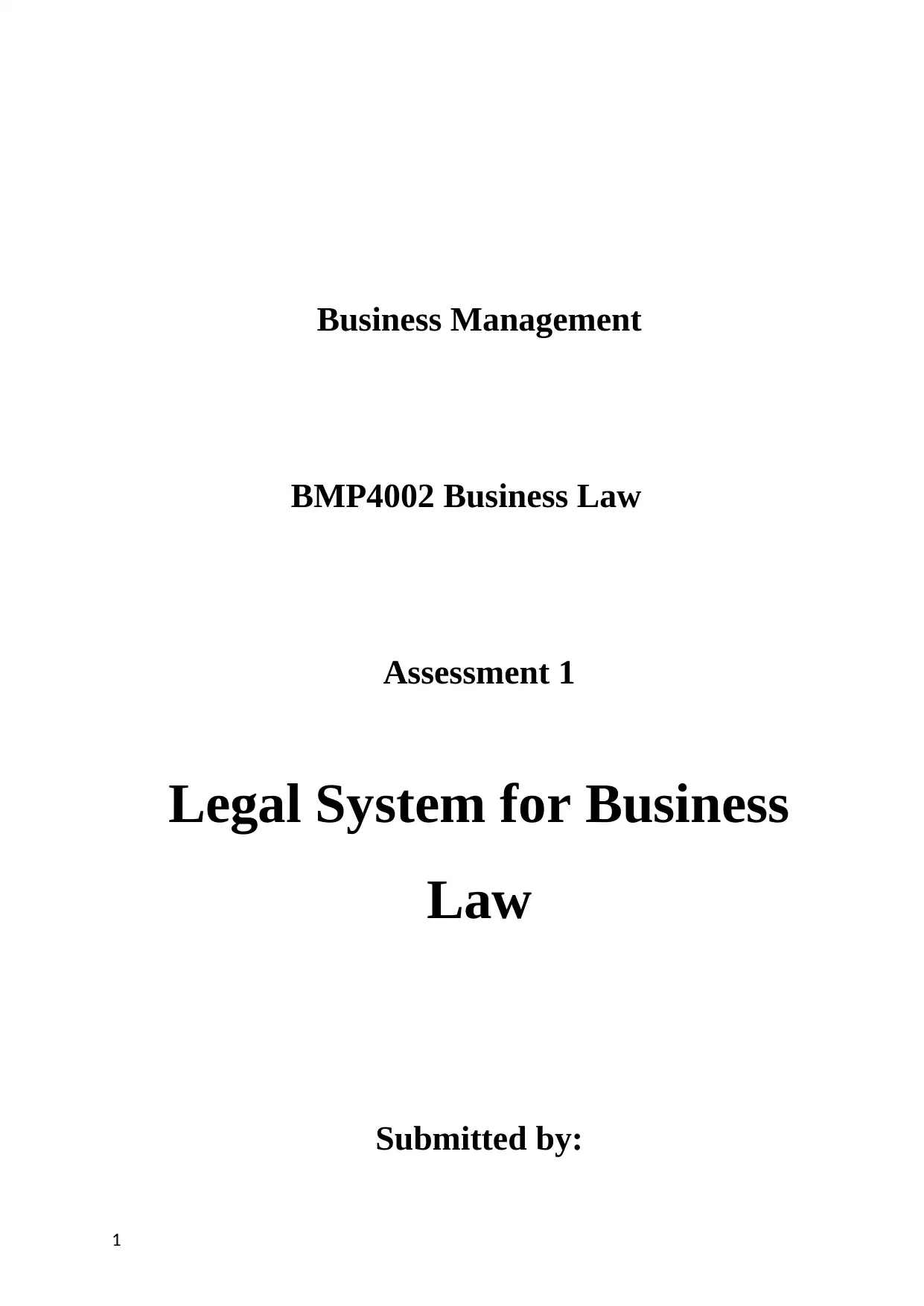
Business Management
BMP4002 Business Law
Assessment 1
Legal System for Business
Law
Submitted by:
1
BMP4002 Business Law
Assessment 1
Legal System for Business
Law
Submitted by:
1
Paraphrase This Document
Need a fresh take? Get an instant paraphrase of this document with our AI Paraphraser
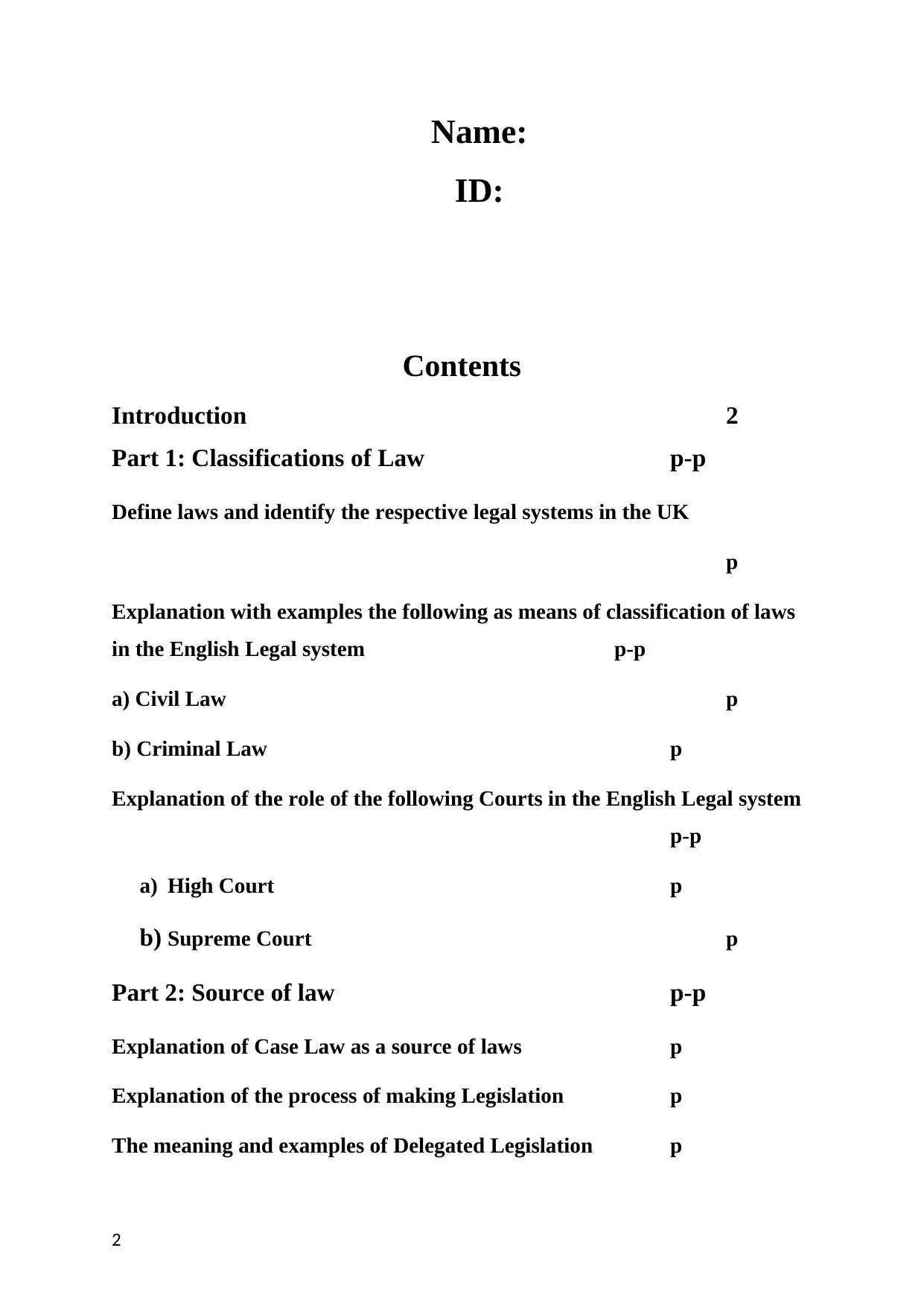
Name:
ID:
Contents
Introduction 2
Part 1: Classifications of Law p-p
Define laws and identify the respective legal systems in the UK
p
Explanation with examples the following as means of classification of laws
in the English Legal system p-p
a) Civil Law p
b) Criminal Law p
Explanation of the role of the following Courts in the English Legal system
p-p
a) High Court p
b) Supreme Court p
Part 2: Source of law p-p
Explanation of Case Law as a source of laws p
Explanation of the process of making Legislation p
The meaning and examples of Delegated Legislation p
2
ID:
Contents
Introduction 2
Part 1: Classifications of Law p-p
Define laws and identify the respective legal systems in the UK
p
Explanation with examples the following as means of classification of laws
in the English Legal system p-p
a) Civil Law p
b) Criminal Law p
Explanation of the role of the following Courts in the English Legal system
p-p
a) High Court p
b) Supreme Court p
Part 2: Source of law p-p
Explanation of Case Law as a source of laws p
Explanation of the process of making Legislation p
The meaning and examples of Delegated Legislation p
2
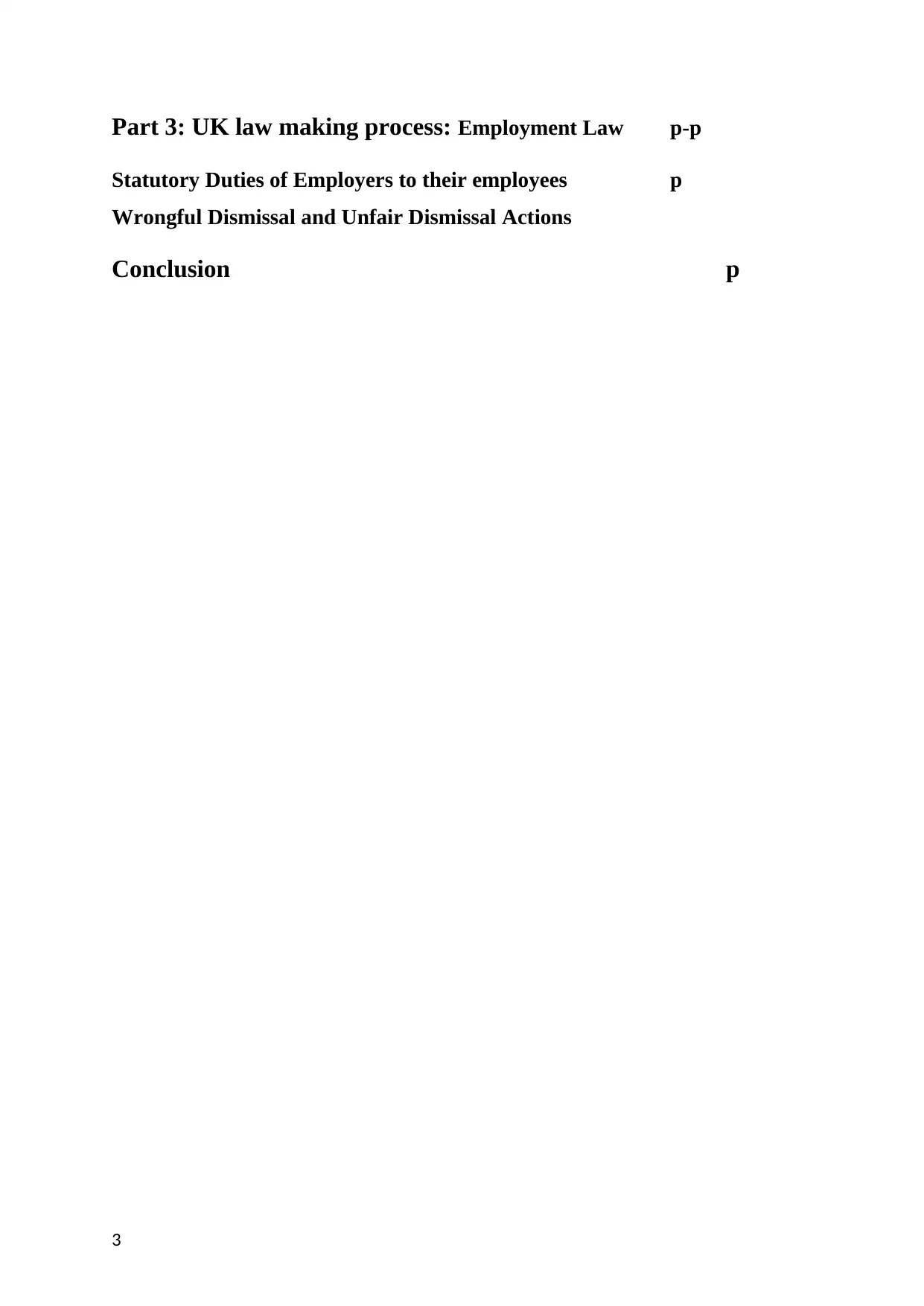
Part 3: UK law making process: Employment Law p-p
Statutory Duties of Employers to their employees p
Wrongful Dismissal and Unfair Dismissal Actions
Conclusion p
3
Statutory Duties of Employers to their employees p
Wrongful Dismissal and Unfair Dismissal Actions
Conclusion p
3
⊘ This is a preview!⊘
Do you want full access?
Subscribe today to unlock all pages.

Trusted by 1+ million students worldwide
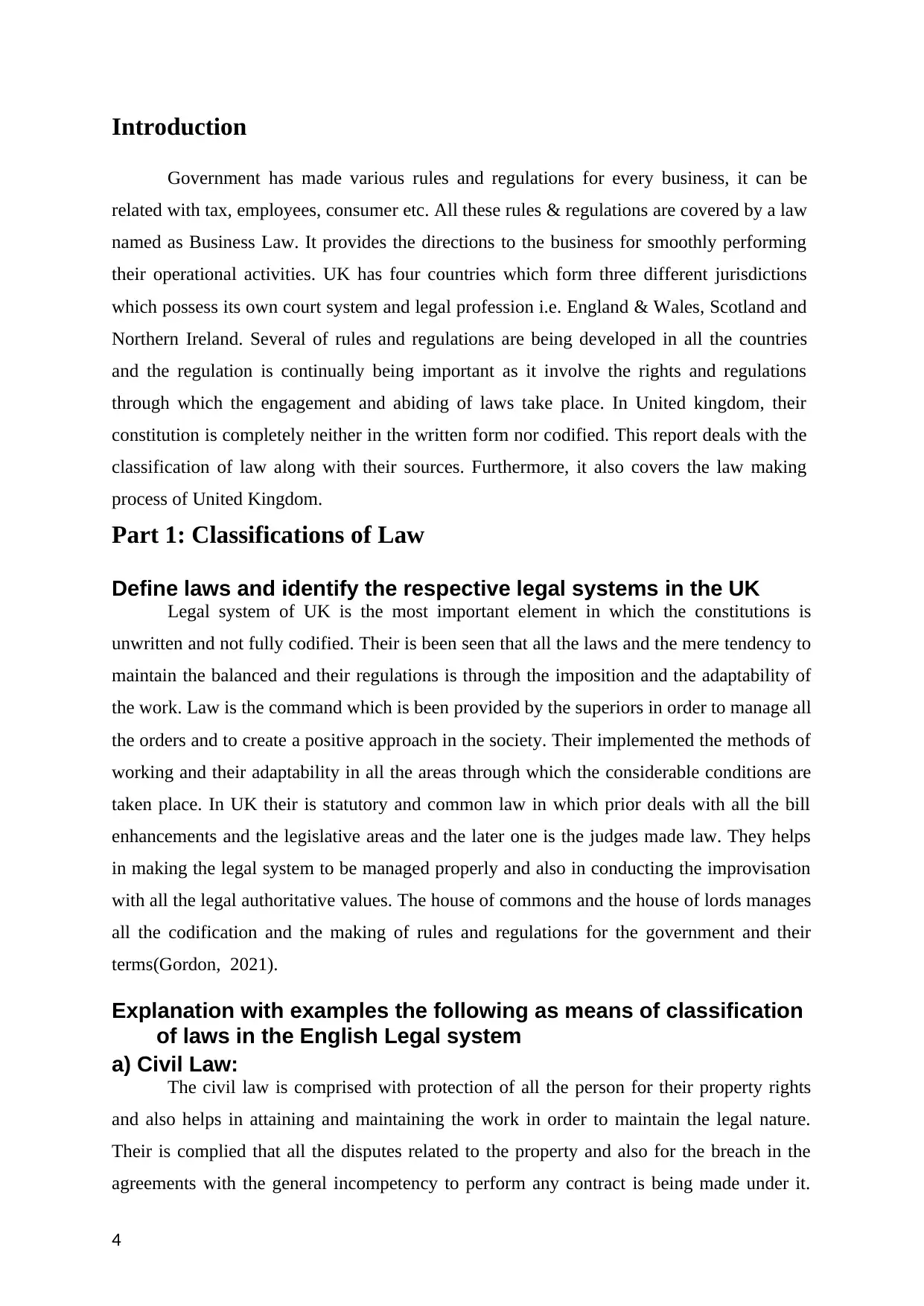
Introduction
Government has made various rules and regulations for every business, it can be
related with tax, employees, consumer etc. All these rules & regulations are covered by a law
named as Business Law. It provides the directions to the business for smoothly performing
their operational activities. UK has four countries which form three different jurisdictions
which possess its own court system and legal profession i.e. England & Wales, Scotland and
Northern Ireland. Several of rules and regulations are being developed in all the countries
and the regulation is continually being important as it involve the rights and regulations
through which the engagement and abiding of laws take place. In United kingdom, their
constitution is completely neither in the written form nor codified. This report deals with the
classification of law along with their sources. Furthermore, it also covers the law making
process of United Kingdom.
Part 1: Classifications of Law
Define laws and identify the respective legal systems in the UK
Legal system of UK is the most important element in which the constitutions is
unwritten and not fully codified. Their is been seen that all the laws and the mere tendency to
maintain the balanced and their regulations is through the imposition and the adaptability of
the work. Law is the command which is been provided by the superiors in order to manage all
the orders and to create a positive approach in the society. Their implemented the methods of
working and their adaptability in all the areas through which the considerable conditions are
taken place. In UK their is statutory and common law in which prior deals with all the bill
enhancements and the legislative areas and the later one is the judges made law. They helps
in making the legal system to be managed properly and also in conducting the improvisation
with all the legal authoritative values. The house of commons and the house of lords manages
all the codification and the making of rules and regulations for the government and their
terms(Gordon, 2021).
Explanation with examples the following as means of classification
of laws in the English Legal system
a) Civil Law:
The civil law is comprised with protection of all the person for their property rights
and also helps in attaining and maintaining the work in order to maintain the legal nature.
Their is complied that all the disputes related to the property and also for the breach in the
agreements with the general incompetency to perform any contract is being made under it.
4
Government has made various rules and regulations for every business, it can be
related with tax, employees, consumer etc. All these rules & regulations are covered by a law
named as Business Law. It provides the directions to the business for smoothly performing
their operational activities. UK has four countries which form three different jurisdictions
which possess its own court system and legal profession i.e. England & Wales, Scotland and
Northern Ireland. Several of rules and regulations are being developed in all the countries
and the regulation is continually being important as it involve the rights and regulations
through which the engagement and abiding of laws take place. In United kingdom, their
constitution is completely neither in the written form nor codified. This report deals with the
classification of law along with their sources. Furthermore, it also covers the law making
process of United Kingdom.
Part 1: Classifications of Law
Define laws and identify the respective legal systems in the UK
Legal system of UK is the most important element in which the constitutions is
unwritten and not fully codified. Their is been seen that all the laws and the mere tendency to
maintain the balanced and their regulations is through the imposition and the adaptability of
the work. Law is the command which is been provided by the superiors in order to manage all
the orders and to create a positive approach in the society. Their implemented the methods of
working and their adaptability in all the areas through which the considerable conditions are
taken place. In UK their is statutory and common law in which prior deals with all the bill
enhancements and the legislative areas and the later one is the judges made law. They helps
in making the legal system to be managed properly and also in conducting the improvisation
with all the legal authoritative values. The house of commons and the house of lords manages
all the codification and the making of rules and regulations for the government and their
terms(Gordon, 2021).
Explanation with examples the following as means of classification
of laws in the English Legal system
a) Civil Law:
The civil law is comprised with protection of all the person for their property rights
and also helps in attaining and maintaining the work in order to maintain the legal nature.
Their is complied that all the disputes related to the property and also for the breach in the
agreements with the general incompetency to perform any contract is being made under it.
4
Paraphrase This Document
Need a fresh take? Get an instant paraphrase of this document with our AI Paraphraser
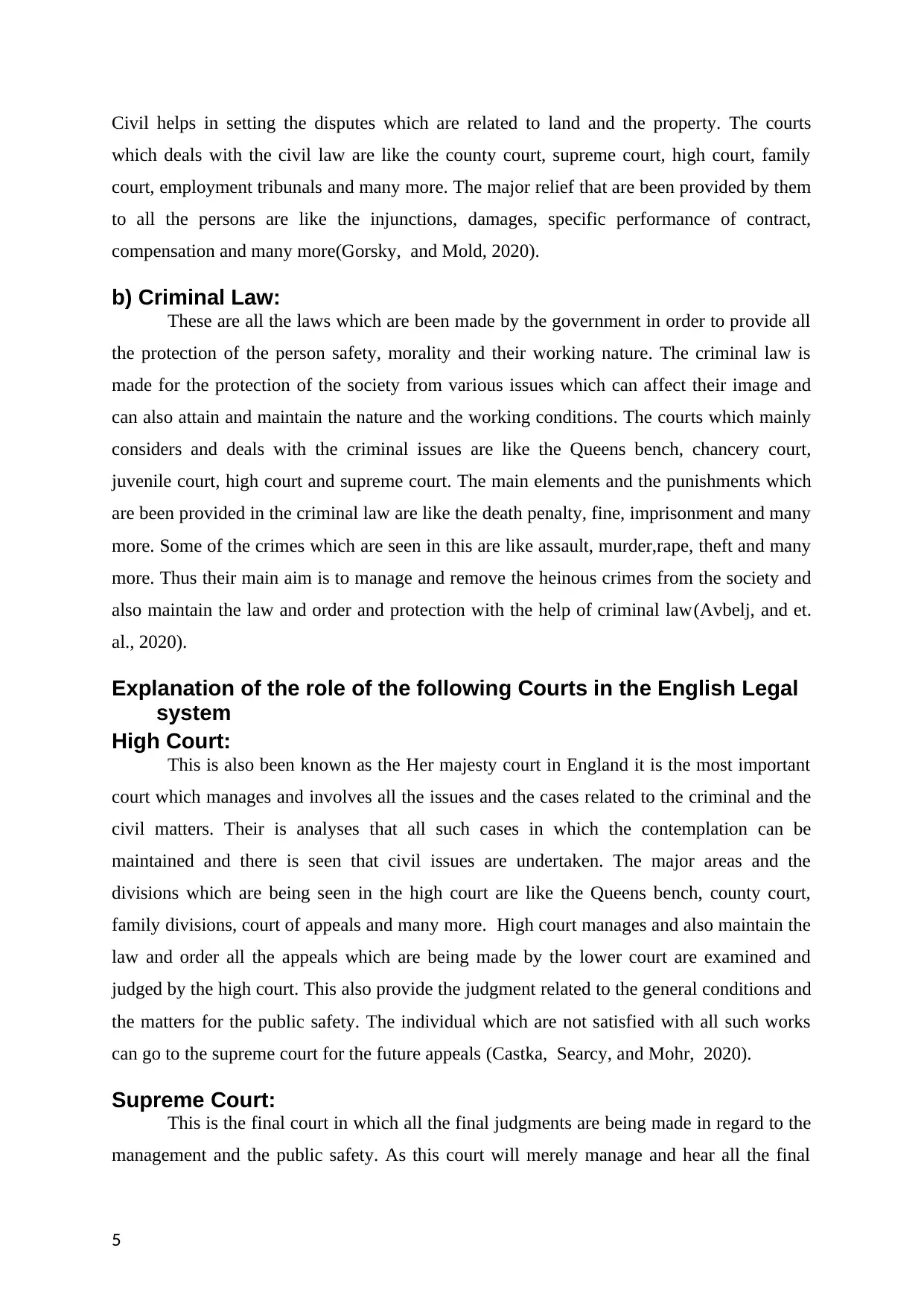
Civil helps in setting the disputes which are related to land and the property. The courts
which deals with the civil law are like the county court, supreme court, high court, family
court, employment tribunals and many more. The major relief that are been provided by them
to all the persons are like the injunctions, damages, specific performance of contract,
compensation and many more(Gorsky, and Mold, 2020).
b) Criminal Law:
These are all the laws which are been made by the government in order to provide all
the protection of the person safety, morality and their working nature. The criminal law is
made for the protection of the society from various issues which can affect their image and
can also attain and maintain the nature and the working conditions. The courts which mainly
considers and deals with the criminal issues are like the Queens bench, chancery court,
juvenile court, high court and supreme court. The main elements and the punishments which
are been provided in the criminal law are like the death penalty, fine, imprisonment and many
more. Some of the crimes which are seen in this are like assault, murder,rape, theft and many
more. Thus their main aim is to manage and remove the heinous crimes from the society and
also maintain the law and order and protection with the help of criminal law(Avbelj, and et.
al., 2020).
Explanation of the role of the following Courts in the English Legal
system
High Court:
This is also been known as the Her majesty court in England it is the most important
court which manages and involves all the issues and the cases related to the criminal and the
civil matters. Their is analyses that all such cases in which the contemplation can be
maintained and there is seen that civil issues are undertaken. The major areas and the
divisions which are being seen in the high court are like the Queens bench, county court,
family divisions, court of appeals and many more. High court manages and also maintain the
law and order all the appeals which are being made by the lower court are examined and
judged by the high court. This also provide the judgment related to the general conditions and
the matters for the public safety. The individual which are not satisfied with all such works
can go to the supreme court for the future appeals (Castka, Searcy, and Mohr, 2020).
Supreme Court:
This is the final court in which all the final judgments are being made in regard to the
management and the public safety. As this court will merely manage and hear all the final
5
which deals with the civil law are like the county court, supreme court, high court, family
court, employment tribunals and many more. The major relief that are been provided by them
to all the persons are like the injunctions, damages, specific performance of contract,
compensation and many more(Gorsky, and Mold, 2020).
b) Criminal Law:
These are all the laws which are been made by the government in order to provide all
the protection of the person safety, morality and their working nature. The criminal law is
made for the protection of the society from various issues which can affect their image and
can also attain and maintain the nature and the working conditions. The courts which mainly
considers and deals with the criminal issues are like the Queens bench, chancery court,
juvenile court, high court and supreme court. The main elements and the punishments which
are been provided in the criminal law are like the death penalty, fine, imprisonment and many
more. Some of the crimes which are seen in this are like assault, murder,rape, theft and many
more. Thus their main aim is to manage and remove the heinous crimes from the society and
also maintain the law and order and protection with the help of criminal law(Avbelj, and et.
al., 2020).
Explanation of the role of the following Courts in the English Legal
system
High Court:
This is also been known as the Her majesty court in England it is the most important
court which manages and involves all the issues and the cases related to the criminal and the
civil matters. Their is analyses that all such cases in which the contemplation can be
maintained and there is seen that civil issues are undertaken. The major areas and the
divisions which are being seen in the high court are like the Queens bench, county court,
family divisions, court of appeals and many more. High court manages and also maintain the
law and order all the appeals which are being made by the lower court are examined and
judged by the high court. This also provide the judgment related to the general conditions and
the matters for the public safety. The individual which are not satisfied with all such works
can go to the supreme court for the future appeals (Castka, Searcy, and Mohr, 2020).
Supreme Court:
This is the final court in which all the final judgments are being made in regard to the
management and the public safety. As this court will merely manage and hear all the final
5
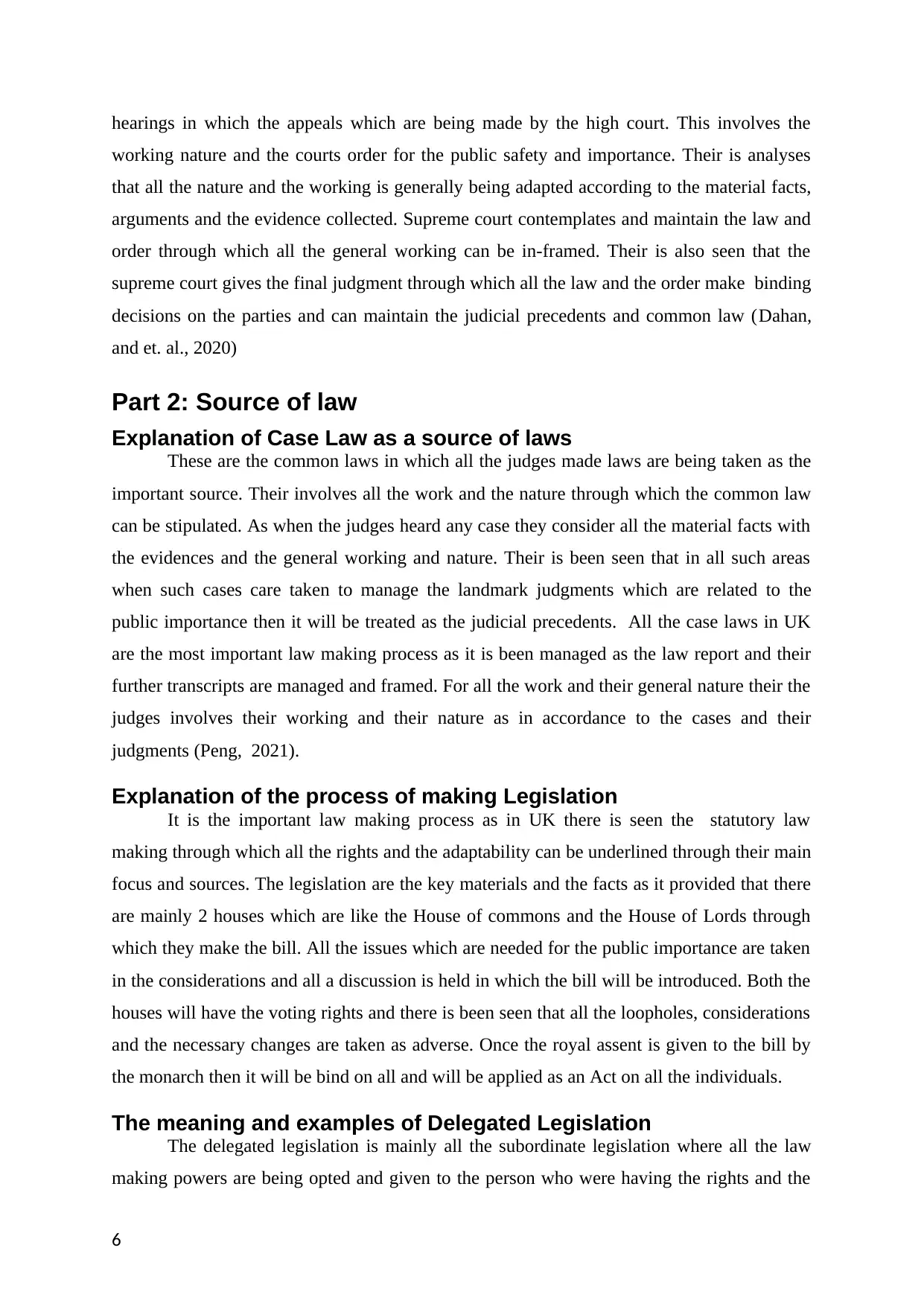
hearings in which the appeals which are being made by the high court. This involves the
working nature and the courts order for the public safety and importance. Their is analyses
that all the nature and the working is generally being adapted according to the material facts,
arguments and the evidence collected. Supreme court contemplates and maintain the law and
order through which all the general working can be in-framed. Their is also seen that the
supreme court gives the final judgment through which all the law and the order make binding
decisions on the parties and can maintain the judicial precedents and common law (Dahan,
and et. al., 2020)
Part 2: Source of law
Explanation of Case Law as a source of laws
These are the common laws in which all the judges made laws are being taken as the
important source. Their involves all the work and the nature through which the common law
can be stipulated. As when the judges heard any case they consider all the material facts with
the evidences and the general working and nature. Their is been seen that in all such areas
when such cases care taken to manage the landmark judgments which are related to the
public importance then it will be treated as the judicial precedents. All the case laws in UK
are the most important law making process as it is been managed as the law report and their
further transcripts are managed and framed. For all the work and their general nature their the
judges involves their working and their nature as in accordance to the cases and their
judgments (Peng, 2021).
Explanation of the process of making Legislation
It is the important law making process as in UK there is seen the statutory law
making through which all the rights and the adaptability can be underlined through their main
focus and sources. The legislation are the key materials and the facts as it provided that there
are mainly 2 houses which are like the House of commons and the House of Lords through
which they make the bill. All the issues which are needed for the public importance are taken
in the considerations and all a discussion is held in which the bill will be introduced. Both the
houses will have the voting rights and there is been seen that all the loopholes, considerations
and the necessary changes are taken as adverse. Once the royal assent is given to the bill by
the monarch then it will be bind on all and will be applied as an Act on all the individuals.
The meaning and examples of Delegated Legislation
The delegated legislation is mainly all the subordinate legislation where all the law
making powers are being opted and given to the person who were having the rights and the
6
working nature and the courts order for the public safety and importance. Their is analyses
that all the nature and the working is generally being adapted according to the material facts,
arguments and the evidence collected. Supreme court contemplates and maintain the law and
order through which all the general working can be in-framed. Their is also seen that the
supreme court gives the final judgment through which all the law and the order make binding
decisions on the parties and can maintain the judicial precedents and common law (Dahan,
and et. al., 2020)
Part 2: Source of law
Explanation of Case Law as a source of laws
These are the common laws in which all the judges made laws are being taken as the
important source. Their involves all the work and the nature through which the common law
can be stipulated. As when the judges heard any case they consider all the material facts with
the evidences and the general working and nature. Their is been seen that in all such areas
when such cases care taken to manage the landmark judgments which are related to the
public importance then it will be treated as the judicial precedents. All the case laws in UK
are the most important law making process as it is been managed as the law report and their
further transcripts are managed and framed. For all the work and their general nature their the
judges involves their working and their nature as in accordance to the cases and their
judgments (Peng, 2021).
Explanation of the process of making Legislation
It is the important law making process as in UK there is seen the statutory law
making through which all the rights and the adaptability can be underlined through their main
focus and sources. The legislation are the key materials and the facts as it provided that there
are mainly 2 houses which are like the House of commons and the House of Lords through
which they make the bill. All the issues which are needed for the public importance are taken
in the considerations and all a discussion is held in which the bill will be introduced. Both the
houses will have the voting rights and there is been seen that all the loopholes, considerations
and the necessary changes are taken as adverse. Once the royal assent is given to the bill by
the monarch then it will be bind on all and will be applied as an Act on all the individuals.
The meaning and examples of Delegated Legislation
The delegated legislation is mainly all the subordinate legislation where all the law
making powers are being opted and given to the person who were having the rights and the
6
⊘ This is a preview!⊘
Do you want full access?
Subscribe today to unlock all pages.

Trusted by 1+ million students worldwide
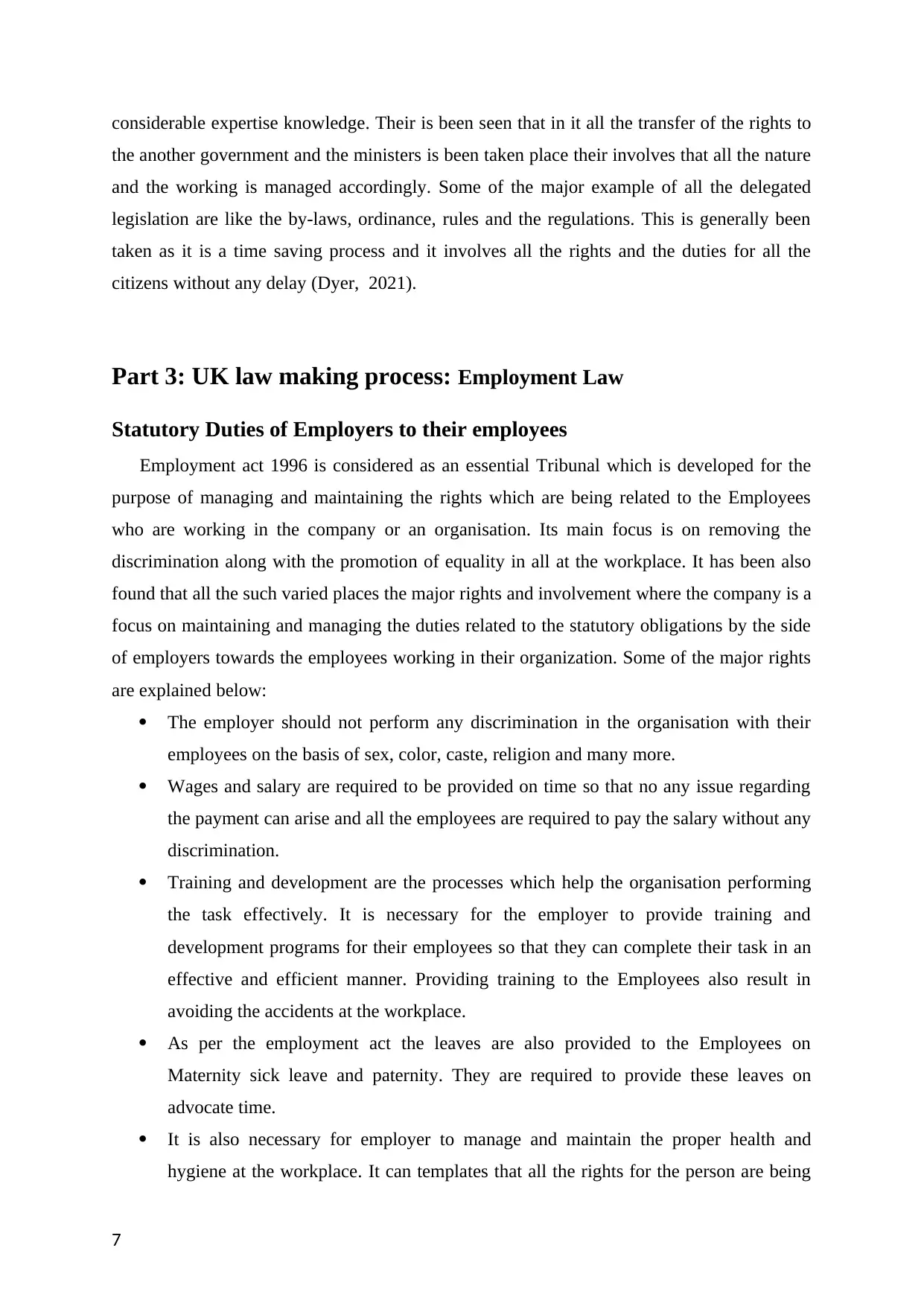
considerable expertise knowledge. Their is been seen that in it all the transfer of the rights to
the another government and the ministers is been taken place their involves that all the nature
and the working is managed accordingly. Some of the major example of all the delegated
legislation are like the by-laws, ordinance, rules and the regulations. This is generally been
taken as it is a time saving process and it involves all the rights and the duties for all the
citizens without any delay (Dyer, 2021).
Part 3: UK law making process: Employment Law
Statutory Duties of Employers to their employees
Employment act 1996 is considered as an essential Tribunal which is developed for the
purpose of managing and maintaining the rights which are being related to the Employees
who are working in the company or an organisation. Its main focus is on removing the
discrimination along with the promotion of equality in all at the workplace. It has been also
found that all the such varied places the major rights and involvement where the company is a
focus on maintaining and managing the duties related to the statutory obligations by the side
of employers towards the employees working in their organization. Some of the major rights
are explained below:
The employer should not perform any discrimination in the organisation with their
employees on the basis of sex, color, caste, religion and many more.
Wages and salary are required to be provided on time so that no any issue regarding
the payment can arise and all the employees are required to pay the salary without any
discrimination.
Training and development are the processes which help the organisation performing
the task effectively. It is necessary for the employer to provide training and
development programs for their employees so that they can complete their task in an
effective and efficient manner. Providing training to the Employees also result in
avoiding the accidents at the workplace.
As per the employment act the leaves are also provided to the Employees on
Maternity sick leave and paternity. They are required to provide these leaves on
advocate time.
It is also necessary for employer to manage and maintain the proper health and
hygiene at the workplace. It can templates that all the rights for the person are being
7
the another government and the ministers is been taken place their involves that all the nature
and the working is managed accordingly. Some of the major example of all the delegated
legislation are like the by-laws, ordinance, rules and the regulations. This is generally been
taken as it is a time saving process and it involves all the rights and the duties for all the
citizens without any delay (Dyer, 2021).
Part 3: UK law making process: Employment Law
Statutory Duties of Employers to their employees
Employment act 1996 is considered as an essential Tribunal which is developed for the
purpose of managing and maintaining the rights which are being related to the Employees
who are working in the company or an organisation. Its main focus is on removing the
discrimination along with the promotion of equality in all at the workplace. It has been also
found that all the such varied places the major rights and involvement where the company is a
focus on maintaining and managing the duties related to the statutory obligations by the side
of employers towards the employees working in their organization. Some of the major rights
are explained below:
The employer should not perform any discrimination in the organisation with their
employees on the basis of sex, color, caste, religion and many more.
Wages and salary are required to be provided on time so that no any issue regarding
the payment can arise and all the employees are required to pay the salary without any
discrimination.
Training and development are the processes which help the organisation performing
the task effectively. It is necessary for the employer to provide training and
development programs for their employees so that they can complete their task in an
effective and efficient manner. Providing training to the Employees also result in
avoiding the accidents at the workplace.
As per the employment act the leaves are also provided to the Employees on
Maternity sick leave and paternity. They are required to provide these leaves on
advocate time.
It is also necessary for employer to manage and maintain the proper health and
hygiene at the workplace. It can templates that all the rights for the person are being
7
Paraphrase This Document
Need a fresh take? Get an instant paraphrase of this document with our AI Paraphraser
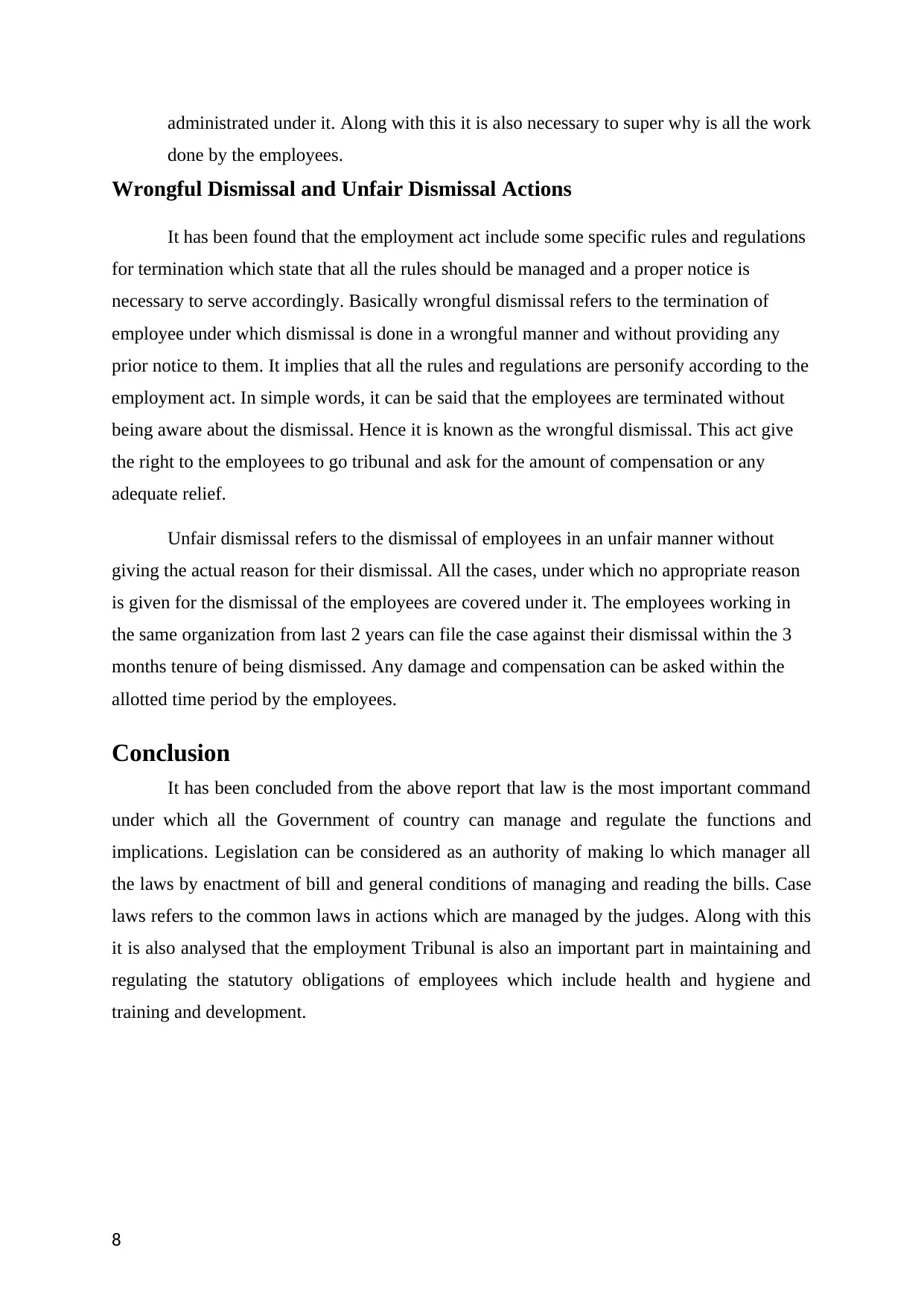
administrated under it. Along with this it is also necessary to super why is all the work
done by the employees.
Wrongful Dismissal and Unfair Dismissal Actions
It has been found that the employment act include some specific rules and regulations
for termination which state that all the rules should be managed and a proper notice is
necessary to serve accordingly. Basically wrongful dismissal refers to the termination of
employee under which dismissal is done in a wrongful manner and without providing any
prior notice to them. It implies that all the rules and regulations are personify according to the
employment act. In simple words, it can be said that the employees are terminated without
being aware about the dismissal. Hence it is known as the wrongful dismissal. This act give
the right to the employees to go tribunal and ask for the amount of compensation or any
adequate relief.
Unfair dismissal refers to the dismissal of employees in an unfair manner without
giving the actual reason for their dismissal. All the cases, under which no appropriate reason
is given for the dismissal of the employees are covered under it. The employees working in
the same organization from last 2 years can file the case against their dismissal within the 3
months tenure of being dismissed. Any damage and compensation can be asked within the
allotted time period by the employees.
Conclusion
It has been concluded from the above report that law is the most important command
under which all the Government of country can manage and regulate the functions and
implications. Legislation can be considered as an authority of making lo which manager all
the laws by enactment of bill and general conditions of managing and reading the bills. Case
laws refers to the common laws in actions which are managed by the judges. Along with this
it is also analysed that the employment Tribunal is also an important part in maintaining and
regulating the statutory obligations of employees which include health and hygiene and
training and development.
8
done by the employees.
Wrongful Dismissal and Unfair Dismissal Actions
It has been found that the employment act include some specific rules and regulations
for termination which state that all the rules should be managed and a proper notice is
necessary to serve accordingly. Basically wrongful dismissal refers to the termination of
employee under which dismissal is done in a wrongful manner and without providing any
prior notice to them. It implies that all the rules and regulations are personify according to the
employment act. In simple words, it can be said that the employees are terminated without
being aware about the dismissal. Hence it is known as the wrongful dismissal. This act give
the right to the employees to go tribunal and ask for the amount of compensation or any
adequate relief.
Unfair dismissal refers to the dismissal of employees in an unfair manner without
giving the actual reason for their dismissal. All the cases, under which no appropriate reason
is given for the dismissal of the employees are covered under it. The employees working in
the same organization from last 2 years can file the case against their dismissal within the 3
months tenure of being dismissed. Any damage and compensation can be asked within the
allotted time period by the employees.
Conclusion
It has been concluded from the above report that law is the most important command
under which all the Government of country can manage and regulate the functions and
implications. Legislation can be considered as an authority of making lo which manager all
the laws by enactment of bill and general conditions of managing and reading the bills. Case
laws refers to the common laws in actions which are managed by the judges. Along with this
it is also analysed that the employment Tribunal is also an important part in maintaining and
regulating the statutory obligations of employees which include health and hygiene and
training and development.
8
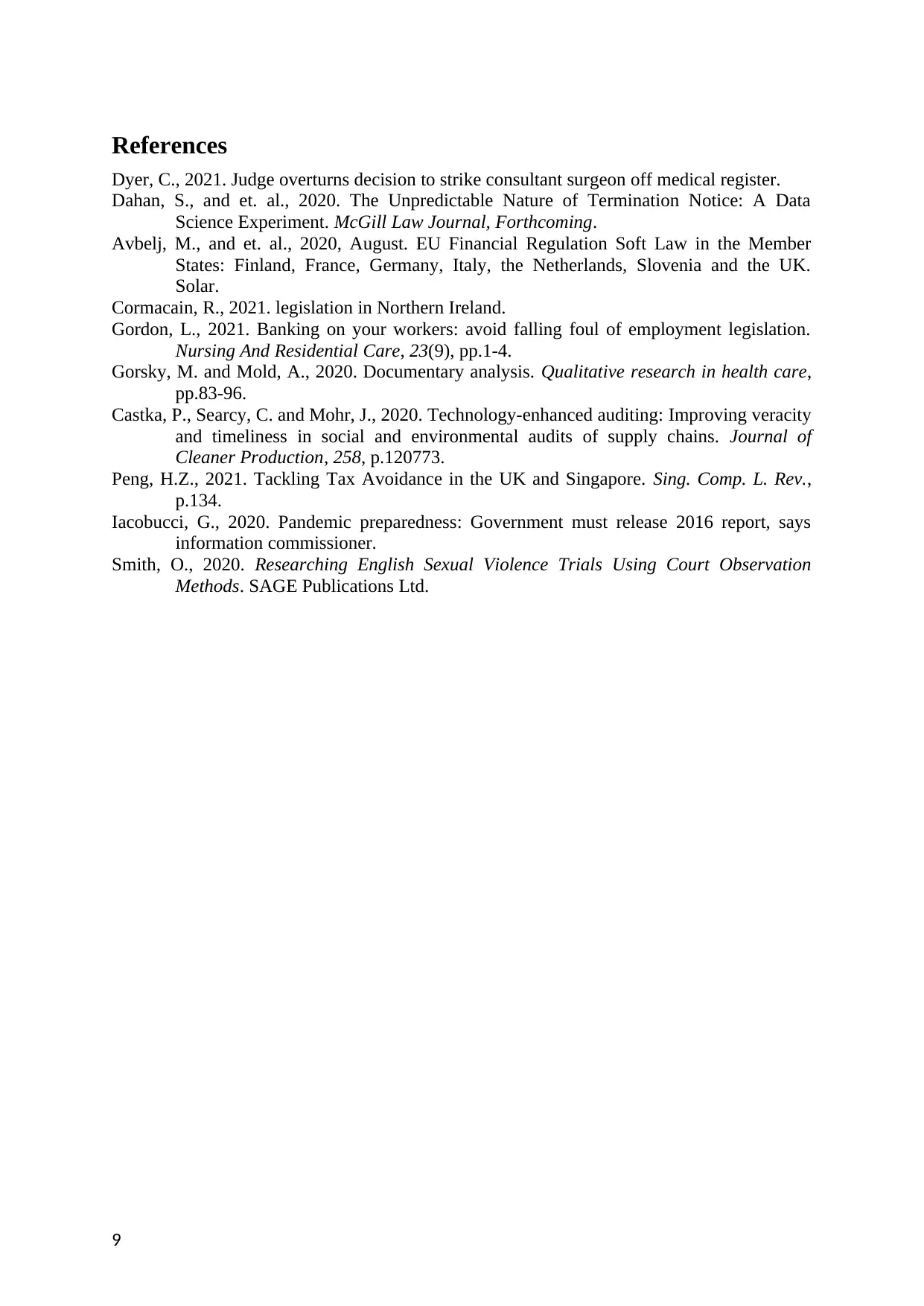
References
Dyer, C., 2021. Judge overturns decision to strike consultant surgeon off medical register.
Dahan, S., and et. al., 2020. The Unpredictable Nature of Termination Notice: A Data
Science Experiment. McGill Law Journal, Forthcoming.
Avbelj, M., and et. al., 2020, August. EU Financial Regulation Soft Law in the Member
States: Finland, France, Germany, Italy, the Netherlands, Slovenia and the UK.
Solar.
Cormacain, R., 2021. legislation in Northern Ireland.
Gordon, L., 2021. Banking on your workers: avoid falling foul of employment legislation.
Nursing And Residential Care, 23(9), pp.1-4.
Gorsky, M. and Mold, A., 2020. Documentary analysis. Qualitative research in health care,
pp.83-96.
Castka, P., Searcy, C. and Mohr, J., 2020. Technology-enhanced auditing: Improving veracity
and timeliness in social and environmental audits of supply chains. Journal of
Cleaner Production, 258, p.120773.
Peng, H.Z., 2021. Tackling Tax Avoidance in the UK and Singapore. Sing. Comp. L. Rev.,
p.134.
Iacobucci, G., 2020. Pandemic preparedness: Government must release 2016 report, says
information commissioner.
Smith, O., 2020. Researching English Sexual Violence Trials Using Court Observation
Methods. SAGE Publications Ltd.
9
Dyer, C., 2021. Judge overturns decision to strike consultant surgeon off medical register.
Dahan, S., and et. al., 2020. The Unpredictable Nature of Termination Notice: A Data
Science Experiment. McGill Law Journal, Forthcoming.
Avbelj, M., and et. al., 2020, August. EU Financial Regulation Soft Law in the Member
States: Finland, France, Germany, Italy, the Netherlands, Slovenia and the UK.
Solar.
Cormacain, R., 2021. legislation in Northern Ireland.
Gordon, L., 2021. Banking on your workers: avoid falling foul of employment legislation.
Nursing And Residential Care, 23(9), pp.1-4.
Gorsky, M. and Mold, A., 2020. Documentary analysis. Qualitative research in health care,
pp.83-96.
Castka, P., Searcy, C. and Mohr, J., 2020. Technology-enhanced auditing: Improving veracity
and timeliness in social and environmental audits of supply chains. Journal of
Cleaner Production, 258, p.120773.
Peng, H.Z., 2021. Tackling Tax Avoidance in the UK and Singapore. Sing. Comp. L. Rev.,
p.134.
Iacobucci, G., 2020. Pandemic preparedness: Government must release 2016 report, says
information commissioner.
Smith, O., 2020. Researching English Sexual Violence Trials Using Court Observation
Methods. SAGE Publications Ltd.
9
⊘ This is a preview!⊘
Do you want full access?
Subscribe today to unlock all pages.

Trusted by 1+ million students worldwide
1 out of 9
Related Documents
Your All-in-One AI-Powered Toolkit for Academic Success.
+13062052269
info@desklib.com
Available 24*7 on WhatsApp / Email
![[object Object]](/_next/static/media/star-bottom.7253800d.svg)
Unlock your academic potential
Copyright © 2020–2026 A2Z Services. All Rights Reserved. Developed and managed by ZUCOL.

